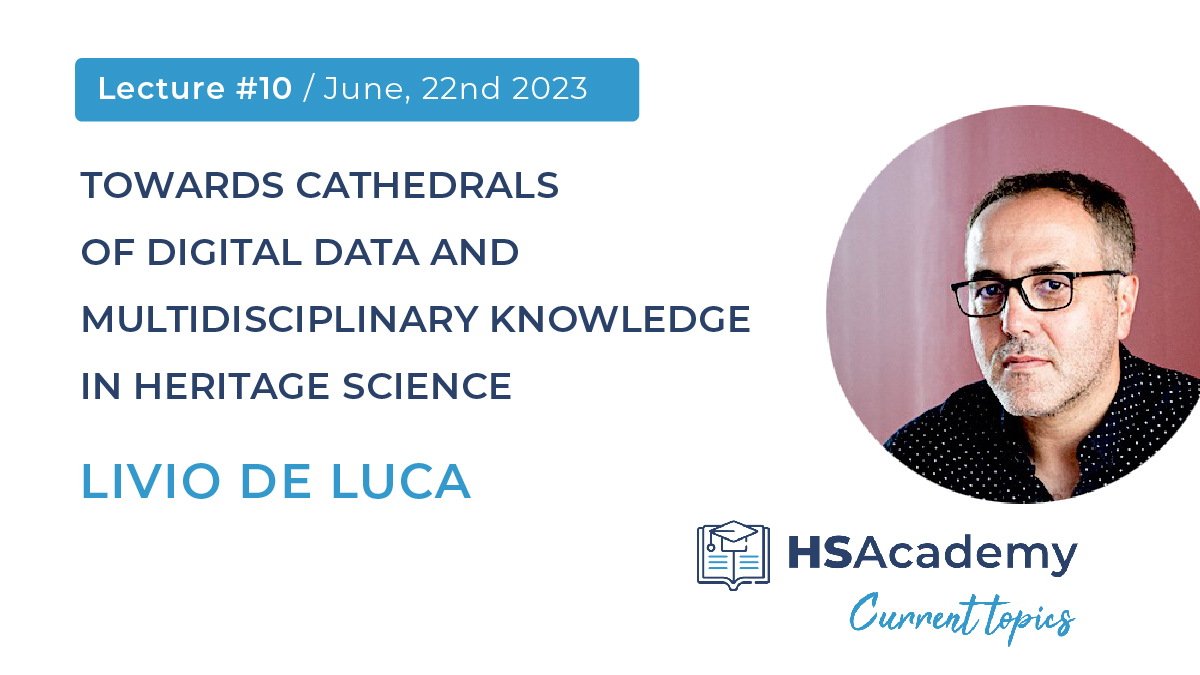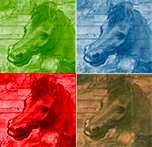
CTinHS Lecture #10: Towards cathedrals of digital data and multidisciplinary knowledge in heritage science
The CTinHS lectures are part of HS Academy: a collaborative initiative between IPERION HS (www.iperionhs.eu) and E-RIHS (www.e-rihs.eu). The two European projects integrate facilities of recognized excellence in Heritage Science, offering access to a wide range of high-level scientific instruments, methodologies, data, tools and training opportunities for advancing knowledge and innovation in the field.
Lecture #10 of the “Current Topics in Heritage Science” series will be delivered by Livio De Luca on Thursday, June 22nd, at 3 pm (Rome time).
Abstract
Cultural heritage research makes the confrontation between material objects and multidisciplinary studies the arena for the production of collective knowledge. In the digital age, this is then a privileged setting for the study of the collective analysis and interpretation of facts, objects and phenomena, bringing together a new generation of data to build new scientific and cultural resources – our tomorrow’s heritage. How can one memorise these bundles of individual gazes directed at one and the same object of study? How to analyse their dynamics of construction, overlap and fusion leading to new knowledge? Our research introduces a new field – a field of multidisciplinary and multidimensional digital data – as raw material for studying the mechanisms of knowledge production in heritage science. With an innovative approach to computational modelling and digitisation, we’re using the exceptional experimental setting of the Notre-Dame de Paris scientific action (involving 175 researchers from disciplines such as archaeology, anthropology, architecture, history, chemistry, physics and computer science) to build a corpus of data on scientific practises in cultural heritage research in the digital age.
By introducing and experimenting next-generation methods and tools for the semantically-enriched data production and analysis, we aim to shift the cursor of digitisation from the physical object to knowledge about the object, in order to analyse the interdependence between the complex features of the material object and the associated knowledge objects built by scholars through their research practises.
Date
June 22nd, 2023 at 3 pm (Rome time zone)
You will learn
- How to collect and structure heritage science data within a collaborative framework
- How to integrate geometry, visual and semantics within digital representations
- How to link material objects with objects of knowledge
Key topics we’ll cover
- Multimodal 3D digitisation applied to architecture and archaeology
- Semantic annotation and structuring of multi-dimensional data
- Knowledge formalisation, data curation and analysis in cultural heritage
- Knowledge engineering, machine learning, content classification and retrieval
Duration
45 minutes (30 minutes + 15 minutes Q&A)
Speaker
Architect, PhD in Engineering, HDR (Habilitation) in Computer Science, Livio De Luca is research director at CNRS and director of CNRS/MC-MAP (Models and simulations for Architecture and Cultural Heritage) unit. General Co-chair of the UNESCO/IEEE/EG DigitalHeritage international congress (Marseille 2013, Grenade 2015) and coordinator and member of national (ANR, FUI, CNRS, MC, …) and international (FP7, Marie-Curie, H2020, …) actions, his research activities focus on surveying, geometric modeling and semantic enrichment of digital representations of heritage objects. Editor of the Journal of Cultural Heritage (Elsevier) and associate editor of the Journal on Computing and Cultural Heritage (ACM) and Digital Applications in Archaeology and Cultural Heritage (Elsevier), he has been an appointed member of the CoNRS (Comité National de la Recherche Scientifique). His work was rewarded in 2007 by the Pierre Bézier Prize (Arts et Métiers Foundation), in 2016 by the Medal for Research and Technology (french Academy of Architecture), in 2019 by the CNRS Medal of Innovation and in 2021 by the “Targa d’Oro” of the UID (Italian Union for Drawing). Since 2019 is the coordinator of the “digital data” working group of the CNRS/Ministry of Culture scientific site for the restoration of Notre-Dame de Paris, and, since 2022, he has held an ERC Advanced Grant.
List of references (attendees can use them to learn more about the topic):
- http://www.ndameheritage.map.cnrs.fr
- https://www.notre-dame.science
- Gros, A., Guillem, A., De Luca, L. et al. Faceting the post-disaster built heritage reconstruction process within the digital twin framework for Notre-Dame de Paris. Sci Rep 13, 5981 (2023). https://doi.org/10.1038/s41598-023-32504-9
- Messaoudi T., Véron P., Halin G., De Luca L. An ontological model for the reality-based 3D annotation of heritage building conservation state. Journal of Cultural Heritage, Volume 29, Elsevier 2018. https://doi.org/10.1016/j.culher.2017.05.017
- Carboni N., De Luca L. An Ontological Approach to the Description of Visual and Iconographical Representations. Heritage vol. 2 n. 2, MDPI 2019. https://doi.org/10.3390/heritage2020078
- De Luca L. Methods, formalisms and tools for the semantic-based surveying and representation of architectural heritage. Journal of Applied Geomatics. Springer, 2011. URL: http://link.springer.com/article/10.1007%2Fs12518-011-0076-7
